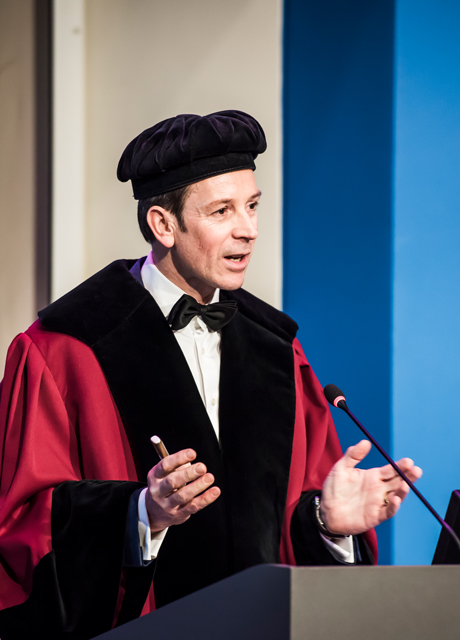Snippets
Edward Huizenga inaugurated as Professor

On 1 February, Edward Huizenga accepted his appointment to the Business Practice Chair for Strategy, Innovation, and Change at Maastricht University’s School of Business and Economics.
The central question of his oration:
Does it make sense to design strategies in disruptive times? Yes, As long as we build on people’s behaviour in daily life. Strategy and innovation are foremost a behaviour challenge.
Dr Huizenga has always been fascinated by iconic companies that come up with innovations that are a success. He looks at why seemingly clever products and services don’t get used, even if there is a market for them. This process falls under what business call the 20/80 Rule. Twenty percent of all innovations are a success in the market while eighty percent don’t live up to expectations.
“We’re constantly asking consumers what they think about specific products and services. And we wonder, when they say upfront they like it, but in the end they do not act upon it by buying and using the product and service: have they being collective lying to us, or have we asked the wrong questions? This is where behavioural science comes into play.”
In his inaugural address, “Strategy meets behaviour: new design principles to innovate”, he asserted that companies should define long-term strategies in disruptive times.
“Theories concerning strategy and innovation work from the supposition that people are rational, but they are not. People have their own, personal beliefs, biases and habits in daily life and make predictable irrational decisions. Strategy is more than a plan, it is a behavioural challenge. To this end, we must balance a variety of opposing movements.”
This is the University’s first Business Practice Chair and Dr Huizenga is the first to occupy it. Alongside his teaching position, Edward Huizenga is partner at Benthurst & Co. a strategy consulting firm where he works for companies in Amsterdam, Brussels, Singapore, Germany, and Switzerland to name just a few. It was in his consulting work that he learned how to combine strategy with innovation and behavioural science. As he sees it, strategy models have been around for a while and don’t work as well as they used to, so they need some rejuvenation. During his inaugural address, he talked about the place in business where strategy meets behaviour.
“Businesses and governments are always performing a balancing act in terms of how aspirational their strategy should be, how much money they want to set aside for innovation, and how closely they should pay attention to the facts or have faith in a higher purpose.”
Dr Huizenga considers the existing way of strategy thinking unbalanced. To remedy this, he works according to six design principles that both businesses and government can use to conceive their own strategies:
1. Aspiration: “Faith over facts” – Balancing an absolute aspiration with demystifying facts.
2. Discipline: “More over core” – Balancing where to play and how we want to win.
3. Movement: “Adjust over act” – Balancing adjustment and acting fast.
4. Behaviour: “Disrupt over do” – Balancing disruptive behaviour with just doing.
5. Innovation: Balancing exploration and exploitation.
6. Impact: Balancing purpose and performance.
“If I can teach my students just one thing, it would be to find out what drives people in their daily lives. In every strategy and every innovation, there is really just one challenge – the behavioural challenge. The better you understand that, no matter how irrational people’s behaviour is, the better you can plan for it.”
Dr Huizenga (1970) holds degrees in Economics from Maastricht University and in Business Administration from the University of Zaragoza. In 2001 he obtained a PhD in Innovation Management at Maastricht University. He has written several management bestsellers, including Innovation Management – How Frontrunners Stay Ahead (2001), The Knowledge Factor (1997), and The Knowledge Enterprise (2015).
The Business Practice Chair is established by UMIO, the executive branch of Maastricht University’s School of Business and Economics (SBE). SBE is a leader in strategy, international business, and behavioural economics.
